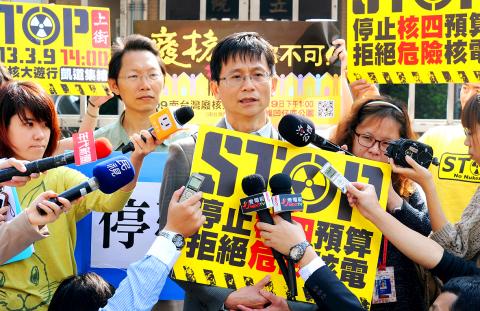|
Civic groups criticize Referendum Act
and Cabinet
By Lee I-chia / Staff reporter

Lawyer Thomas Chan, center,
displays a placard that reads: “Stop the budget for the Fourth Nuclear Power
Plant” outside the legislature in Taipei yesterday.
Photo: Sam Yeh, AFP
Civic groups yesterday criticized the high
threshold required by the Referendum Act (公民投票法) and accused the Cabinet of
trying to escape its responsibilities by putting the completion of the Fourth
Nuclear Power Plant to a referendum.
Responding to the Cabinet’s announcement on Monday, civic groups led by the
Green Citizens’ Action Alliance (GCAA) and Citizens of the Earth, Taiwan (CET),
held a demonstration in front of the legislature yesterday, urging political
parties not to make the issue a political struggle and the Cabinet to take
responsibility and stop the project.
“An unsafe nuclear power plant will not become a safe one through a referendum,”
the groups said.
Thomas Chan (詹順貴), an attorney who has worked closely with environmental groups,
said the referendum would be a “false referendum” because the law requires more
than 50 percent of eligible voters to vote for the result of a referendum to be
valid, making the initiative to “stop the plant’s construction” hard to pass as
it would require at least 4.5 million votes.
CET representative Yang Chun-lang (楊俊朗) said a referendum would not prevent
nuclear disasters from happening, adding that after the many scandals during the
construction of the power plant, the government should take responsibility, stop
the project and reject any additional budget, rather than handing responsibility
to voters.
GCAA chairperson Lai Wei-chieh (賴偉傑) said the government should stop threatening
the public with slower economic development and higher electricity prices and
apologize for spending so much taxpayers’ money on the project.
GCAA secretary-general Tsuei Su-hsin (崔愫欣) urged the public to protest against
nuclear power at a national parade on March 9.
However, the Taiwan Environmental Protection Union (TEPU) held a press
conference to express its positive attitude toward the government’s decision,
but also stressed that the law should be amended.
“The Referendum Act has many flaws,” TEPU founder and chairman Shih Hsin-min
(施信民) said.
Shih said the high threshold should be amended and he suggested that the
initiative should be a “positive discourse” asking “should the Fourth Nuclear
Power Plant construction project be continued” — meaning it would need the
approval of 50 percent of eligible voters for construction to be continued —
rather than the negative discourse Jiang mentioned on Monday.
“Also, both sides of the issue should get fair resources to advocate their
position to the public before the referendum takes place,” he said, adding that
another way to deal with the issue would be to pass an amendment to the Nuclear
Reactor Facilities Regulation Act (核子反應器設施管制法) allowing residents living within
a 50km radius of a nuclear power plant to decide its fate via a local
referendum.
Gloria Hsu (徐光蓉), TEPU academic committee convener and a professor of
atmospheric sciences at National Taiwan University, criticized the Cabinet for
“instructing” lawmakers to act according to its will and stigmatizing
anti-nuclear groups as “irrational” and “selfish” for “sacrificing cheaper
electricity and economic development.”
The group said it would organize an anti-nuclear protest in New Taipei City’s
(新北市) Jinshan District (金山) on Sunday.
|
![]()
![]()
![]()